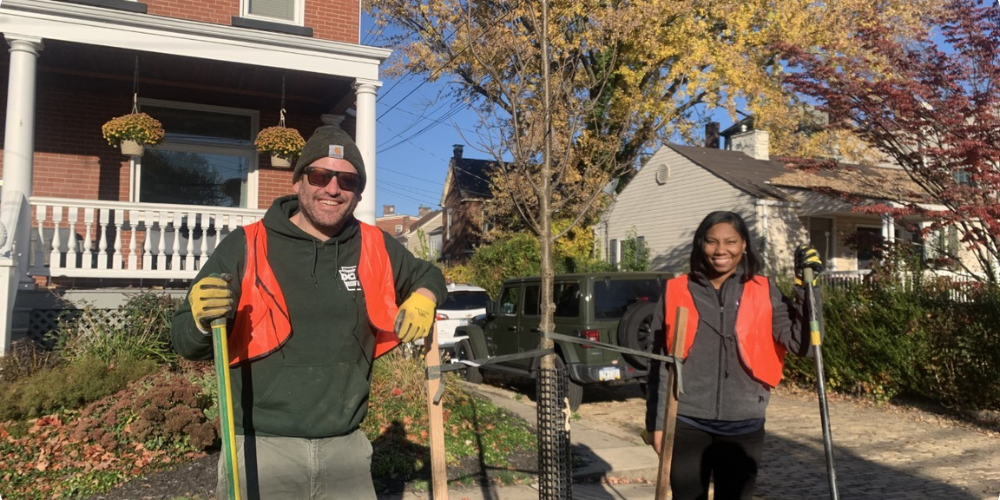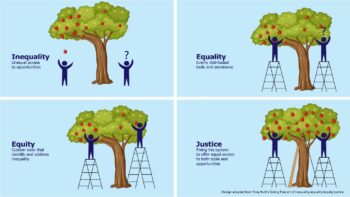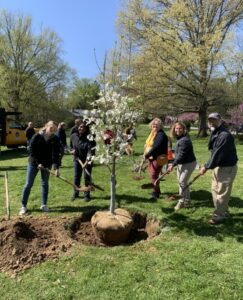
Trees have been around since the beginning of time. They are vital to our shared ecosystem and provide critical functions of absorbing and storing carbon that help combat climate change while also helping to clean our air.
But that’s not all. Trees provide a multitude of benefits to communities by increasing property values, reducing energy costs, attracting birds and wildlife, reducing noise, slowing runoff and erosion after storms, and supporting jobs in the environmental and agriculture sector.
The Pennsylvania Department of Conservation and Natural Resources (DCNR) Bureau of Forestry is dedicated to helping communities plan for, plant, and care for trees throughout the Commonwealth. The Urban and Community Forestry Program, formerly known as TreeVitalize, offers an array of technical and practical education opportunities about the benefits of trees and the importance of proper planting and tree care, not just for today, but for generations to come. And with the U.S. population continuing to increase (7.4% from 2010-2020 which is equivalent to 22.7 million people), it is increasingly important that humans do as much as possible to help preserve and conserve trees to save the planet.

Tree Equity quickly became a buzz word in 2021 when DCNR made Pennsylvania the first state to hire a tree equity specialist. The phrase “tree equity” reflects the process of tailoring strategic tree planning and planting to the specific needs of the people in a neighborhood or community. Equity is often confused with equality, but they are two vastly different approaches. Equality views and considers every neighborhood or community the exact same way, despite differences in need. Equity acknowledges the nuanced needs of each neighborhood and community to provide targeted recommendations and support their unique challenges and goals.
Today the Urban and Community Forestry Program in Pennsylvania is a team of four full-time staff members. The program is led by Joseph ‘Ned’ Brockmeyer, Program Manager. His work cultivates partnerships, funding, and program connections. Celine Colbert is the Tree Canopy Coordinator, focusing on technical assistance, Assistant District Foresters program, and PA Tree Map. Kalaia Tripeaux is the Tree Equity Specialist Coordinator. She collaborates with communities, building interest and support for a statewide pull for equity work. And rounding out the team is Orsoyla ‘Orsi’ Lazar, Regional Community Tree Specialist for the Chesapeake Bay area, who assists with professional tree needs such as pruning and training, while actively being a part of the communities in that area.
And since there’s no single strategic plan robust and flexible enough to fully evaluate and aid green infrastructure growth and expansion, tree equity specialists help to bridge the gap between communities and beneficial partnerships and resources. To do this, tree equity specialists develop deep, genuine partnerships, connecting with community members and groups, local and state organizations, and governmental agencies to guarantee access to healthy trees in all communities.
 In the Spring of 2023, the U.S. Forest Service announced an historic $1.5 billion in funding for Urban and Community Forestry Programs nationwide under the Inflation Reduction Act. The funding is designated to support urban tree-planting, urban forest planning and management, and related activities, particularly in disadvantaged communities. By working with state partners and community tree groups, the program invests from the ground up in communities, improving more than 140 million acres of urban and community forest across the United States. Pennsylvania received a $9.75m award.
In the Spring of 2023, the U.S. Forest Service announced an historic $1.5 billion in funding for Urban and Community Forestry Programs nationwide under the Inflation Reduction Act. The funding is designated to support urban tree-planting, urban forest planning and management, and related activities, particularly in disadvantaged communities. By working with state partners and community tree groups, the program invests from the ground up in communities, improving more than 140 million acres of urban and community forest across the United States. Pennsylvania received a $9.75m award.
Working alongside the Urban and Community Forestry team are invaluable partners like Penn State Extension (education and outreach with communities), Philadelphia Horticultural Society, Pittsburgh Forestry, Western Pennsylvania Conservancy, TreePGH, TreePennsylvania (bare root grants), and United States Forest Service (USFS).
Across the country, there are five tree equity specialists: Kalaia Tripeaux (PA) Colleen Berg (OH), Molly Codding (MN), Rachel O’Leary (CA) and Alicia Hamilton (Washington State). Together, they work as a holistic collaborative to exchange information, ideas, projects, and concepts that can be used across a range of communities. Ultimately, the goal is for all 50 states to have tree equity specialists, creating a network of support to help communities with best management practices, strategic planning, grant writing, and assistance to plant, protect, and maintain trees nationwide.